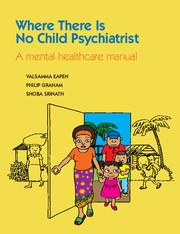Book contents
- Frontmatter
- Contents
- Preface
- Acknowledgements
- Abbreviations
- List of tables and boxes
- 1 Introduction
- 2 Assessment and treatment: general principles
- 3 Making a summary and action plan
- 4 Development and developmental problems
- 5 Intellectual disability
- 6 Habit disorders
- 7 Emotional problems
- 8 Behaviour and related problems
- 9 Specific problems in adolescence
- 10 Alcohol and drug dependency
- 11 Psychotic disorders
- 12 Chronic physical illness and disability
- 13 Physical illness without an identifiable physical explanation
- 14 Stressful situations
- 15 Parents and the needs of children
- 16 Mental health promotion
- 17 Medication
- References and suggested reading
- Appendix 1 My star chart
- Appendix 2 Guide to medication for use in childhood mental disorders
- Index
9 - Specific problems in adolescence
Published online by Cambridge University Press: 29 April 2024
- Frontmatter
- Contents
- Preface
- Acknowledgements
- Abbreviations
- List of tables and boxes
- 1 Introduction
- 2 Assessment and treatment: general principles
- 3 Making a summary and action plan
- 4 Development and developmental problems
- 5 Intellectual disability
- 6 Habit disorders
- 7 Emotional problems
- 8 Behaviour and related problems
- 9 Specific problems in adolescence
- 10 Alcohol and drug dependency
- 11 Psychotic disorders
- 12 Chronic physical illness and disability
- 13 Physical illness without an identifiable physical explanation
- 14 Stressful situations
- 15 Parents and the needs of children
- 16 Mental health promotion
- 17 Medication
- References and suggested reading
- Appendix 1 My star chart
- Appendix 2 Guide to medication for use in childhood mental disorders
- Index
Summary
Introduction
Case 9.1
Sixteen-year-old Abra's mother came to see a health professional saying she was worried about her son and that she could not sleep and was off her food. She said she could not concentrate on her office job; she was getting told off by her boss, who said she was making too many mistakes. She said that Abra had given up going to school, and did not have a job. He was smoking and drinking. She thought he was seeing a girl who was ‘no good’. He always came home late at night and sometimes did not come home at night at all. She had no idea where he was. Then he would lie in bed in the morning saying he was too tired to get up. If she asked him to do some shopping, he snapped at her and told her he was not ‘her slave’. His father gave him money, which was how he could afford the cigarettes and alcohol. She herself had attended a convent school with nuns as teachers and had been kept at home by strict parents in her teenage years and this was what she wanted to do with Abra, but it was impossible. She went to mass regularly, but Abra never came. Her husband said Abra was just a normal adolescent. Abra had never been very good at schoolwork and had often been in trouble at school, which he had left when he was 14. She felt the school had been quite pleased when Abra stopped attending. He had never been in trouble for breaking the law. What should the health professional do?
Information about adolescent problems
In most high-income countries, adolescence is defined as the period between puberty and adulthood, from about 13 to 19. In these countries it is often thought ‘normal’ for young people of this age to rebel against their parents and other authority figures and to become involved in risky behaviour such as drinking alcohol, smoking, taking drugs and engaging in sexual promiscuity. Other features thought to be normal in adolescence are irritability and mood swings. There are two relatively new features of normal adolescence seen in different countries and cultures.
- Type
- Chapter
- Information
- Where There Is No Child PsychiatristA Mental Healthcare Manual, pp. 87 - 98Publisher: Royal College of PsychiatristsPrint publication year: 2012
- Creative Commons
- This content is Open Access and distributed under the terms of the Creative Commons Attribution licence CC-BY-NC-ND 4.0 https://creativecommons.org/cclicenses/



